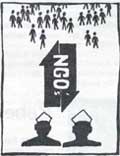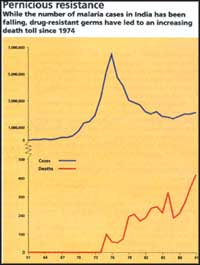
Boffins unchained
IMAGINE a rapidly expanding gas confined in a container and subject to immense external pressure. The laws of science tell us that the balance of forces cannot be sustained for long without some

IMAGINE a rapidly expanding gas confined in a container and subject to immense external pressure. The laws of science tell us that the balance of forces cannot be sustained for long without some

Local communities in Nepal and some Central American nations have become invaluable participants in managing their forests

Controversy has dogged the Konkan railway project since its inception. Today, many influential Goans are up in arms against the present alignment of the track, which, they allege, would wreck the state"s environment. Railway officials, of course, disagree
A couple of decades from now, the West may have to combat an unprecedented water crisis. Contamination and wastage will only hasten the process

The most powerful government in the world and the behemoth tobacco industry are waging a ding-dong battle over...well, cigarettes

Non governmental organisations have a vital role to play in motivating the people to manage their own resources better
Prasenjit Bose Since the Finance Minister would not have the opportunity to present a full Budget in 2009 because of impending Lok Sabha elections, Budget 2008-09 would be his last opportunity to fulfil the promises made in the National Common Minimum Programme (NCMP). The expenditure priorities have already been set forth by the Eleventh Plan. What is required is adequate budgetary support for the Plan, especially in priority areas like agriculture, PDS, education, health and employment generation. To meet the NCMP commitments, the gross budgetary support (GBS) for the Plan has to be stepped up. Budgets in 2006 and 2007 witnessed increases in GBS by around Rs 30,000 crore over previous years. It is evident that an increase of such magnitude, which amounts to less than 1% of current GDP, is inadequate for vital expenditure commitments. The increase in the GBS should be twice the amount seen in recent budgets. Agriculture, which was promised a new deal under the UPA, continues to languish. The advanced estimates for 2007-08 already show agricultural growth slipping to 2.6%, compared to 3.4% registered in 2006-07. To meet the Eleventh Plan target of 4% agriculture growth rate, the government needs to replace the half-hearted measures adopted so far with substantial allocations for debt relief, the Food Security Mission and Rashtriya Krishi Vikas Yojana. The rise in prices of essential commodities over the last two years has underlined the importance of strengthening the PDS. Domestic food production and public procurement also needs to increase to avoid the embarrassment of high-cost wheat imports. India should increase the food subsidy, which currently stands only at around 1% of GDP. It is also time to consider doing away with the targeted PDS, which has turned out to be a failure, and introduce a revamped, more efficient and universal PDS. The ban on futures trading of wheat, rice and some pulses imposed last year should continue for the sake of stability in food prices. Education and health have been accorded high priority under the Eleventh Plan. Expenditure on the former, up five-fold over the Tenth Plan, is aimed at building 6,000 schools, funding the Sarva Shiksha Abhiyan to ensure the Right to Education, building new ITIs and vocational training institutes to bridge the skill deficit, and setting up 30 new central universities along with new IITs, IIMs and IISERs to expand the country's knowledge base. These laudable objectives have to be backed up by adequate outlays. Outlays on the rural health mission and more Aiims-type institutions also have to be increased. The universalisation of the ICDS is being impeded by inadequate funding, which needs to be addressed. The NREGA, despite problems, has succeeded in providing work to 27.7 million people this year. No doubt, its implementation needs to be streamlined and the monitoring mechanism improved. However, this should not come in the way of expanding the employment guarantee to all rural districts and also to urban areas. This is the single biggest welfare measure adopted by the UPA government, and has offered relief to the poorest and most vulnerable. This safety net must be strengthened under all circumstances. The revenue buoyancy seen over the past few years should help mobilise resources for increased welfare expenditure and public investments. Efforts to widen the tax base should continue. The last Budget contained a study of corporate tax, which showed that the effective tax rate for Companies in 2006-07 was 19.2% against the scheduled tax rate of 33.6%. Tax concessions to corporate taxpayers increased from Rs 34,618 crore in 2005-06 to Rs 50,075 crore in 2006-07. Budget 2008-09 should take steps to bring down these tax expenditures. The burgeoning foreign exchange reserves built up on the basis of FII inflows have turned into a liability. Rupee appreciation is hurting export sectors and efforts to buy up foreign exchange followed by sterilisation are also leading to additional fiscal costs. Reintroduction of long-term capital gains tax and increasing the rate of the short-term capital gains tax and the STT would help stanch the inflow of speculative capital, curb equity market volatility and raise resources. Budget 2008 also offers the opportunity to initiate the long pending restructuring of the indirect tax structure on petroleum products

Diseases that were cheerfully believed to have been eradicated are inexplicably cropping up again in India in deadlier, drug resistant forms

Certain fruits and vegetables guard the body against cancer

Despite being clean, alternative fuels fail to become the first choice
THE demand for food in Bangladesh and around the world is changing rapidly. Driven by economic growth, rising incomes, and urbanisation, demand is shifting away from traditional staples toward high-value food commodities. High value agricultural commodities include fruits, vegetables, spices, fish, and livestock products, many of them processed before reaching the market. In Bangladesh, additional demand for these commodities is projected to be worth about $8 billion by 2020 (in 2005 prices). This represents an enormous opportunity for food producers, processors, and sellers. Owing to the greater labour intensity characteristic of high value agricultural production, it also provides an opportunity to generate rural employment and raise rural incomes. More than 80% of people living on less than $2 a day in Bangladesh live in rural areas. This spatial distribution of poverty makes capitalising on the opportunities afforded by high value agricultural production an important strategic priority for those seeking to reduce poverty in the country. Yet, for all of its promise, capitalising on these opportunities is fraught with challenges. High value agricultural products are generally far more perishable than traditional staples, and require more sophisticated post-harvest technologies and faster and more controlled transport. Insufficient processing capacity, the lack of cold storage facilities or a functioning cold chain, and the persistence of transport bottlenecks are significant constraints to high value agriculture in Bangladesh. The promise of generating higher income and increased export revenues by accessing international markets is matched by the challenges of meeting the exacting quality and safety standards that apply in those markets -- and by the prospect of having to compete with high quality imports from those markets. Most importantly, even assuming that opportunities afforded by high value agriculture are successfully seized upon, there is no reason whatsoever to assume that the benefits of this success will extend naturally or automatically to those who need them most urgently -- Bangladesh's rural poor. A new report published this month by the World Bank and the IFC-SEDF, entitled High-value Agriculture in Bangladesh, examines the opportunities and constraints that Bangladeshi agro-businesses face in shifting to this type of production. The report presents case studies of five high-value agricultural industries/sub-sectors: aquaculture, small-scale commercial poultry, fruits and vegetables, high-value aromatic rice, and dairy, and examines cross-cutting issues that emerge as priorities for promoting high-value agriculture and related agro-business development in Bangladesh. Bangladesh's strong comparative advantage in fish production, together with burgeoning domestic and foreign demand for fish products makes aquaculture an industry of tremendous potential growth. Yet, quality problems and low productivity could blunt the competitiveness of the shrimp export industry. Improvements in pond management and the use of disease-free seed are needed to significantly improve the productivity in brackish water shrimp farms. Genetic improvement of fish stocks, combined with technical advice for farmers, are essential to sustain the freshwater aquaculture industry. Quality advisory services could also transform Bangladesh's poultry industry, where rapid growth in the last 15 years has been concentrated among large, well-established commercial enterprises. Improving technical knowledge, efficiency, control over inputs, and access to credit among small-scale poultry producers could extend this growth, generating employment and helping reduce poverty in rural areas. It will also enable them to better deal with the urgent practical realities surrounding highly pathogenic avian influenza (HPAI). Consumption of fruits and vegetables is growing in Bangladesh. Yet, the limited availability of reliable planting material and hybrid seed keeps productivity low. Post-harvest losses are high. Farmers need better market information to synchronise production with demand. High informal transportation tolls lead to excessive marketing costs. The prospects of profitably adding value through processing are limited by unreliable power supplies, which also afflict rice milling -- including the high-value aromatic rice treated in the report. The variable performance of Bangladesh's fruit and vegetable exports is unlikely to improve unless specific steps are taken to ensure long-term growth. It is important to note that the value added in Bangladesh's domestic market will likely dwarf any value addition obtainable through exports. Production for domestic consumers will also have a far greater impact on farmers' incomes than production for export. Even with relatively slow growth in per capita milk consumption compared to other high value foods, domestic production still cannot meet existing demand and Bangladesh relies heavily on imports of powdered milk. But unless they can significantly improve productivity, dairy producers in Bangladesh are unlikely to compete with imports. Dairying appears to be profitable only in certain parts of the country, where feed is more readily obtained and where there is some milk-marketing infrastructure. In these areas, farmers would benefit from better marketing arrangements as well as more effective animal health and breeding services and improved animal nutrition strategies. The formation of effective dairy producer associations could go far in improving milk marketing. The case studies presented in the report suggest a number of recommendations and policy options for developing agro-business in the country. A number of these relate to improving the investment climate and providing a more enabling environment in which the costs and intricacies of doing business are significantly reduced. Some relate to removing policy distortions, regulations, and informal tolls and costs that make doing business unnecessarily cumbersome. The case studies point unambiguously to the cardinal importance of food quality and safety. Consumers must be confident that the high-value products available to them in the market are not a public health risk if demand for these goods is to continue growing. Improving the awareness and understanding of food safety risks, and how to minimise, them is necessary for producers, consumers, and everyone along the supply chain that connects them. The capacity of institutions with regulatory responsibilities needs to be developed with new skills and technologies. High-value agriculture requires technical skills and knowledge not generally associated with more traditional production, making human capital development and knowledge management important elements in the transition. There is a lack of reliable data on most high-value agricultural commodities that deprives policy makers, planners, and investors of critical information. Systematically benchmarking and monitoring this information will enable planners to identify, document, and scale-up best practices in high value agriculture and related value chains. Access to timely and reliable market information and to new technologies will go far in determining the competitiveness and profitability of agro-businesses. Applied research is needed to build an effective knowledge base that is available to investors who participate and compete in high-value agro-business. The institutions that carry out this research and develop new technologies adapted to conditions in Bangladesh will require combinations of public and private financing and management. Procurement arrangements like contract farming are expanding rapidly in Bangladesh, and provide for more orderly marketing with less price volatility and better sharing of risks and rewards. Contract enforceability remains a major challenge, with breaches common among both producers and purchasers. Building trust and developing positive social capital is ultimately the best way to improve contract enforceability, but this of course takes time. Strengthening producer organisations may help enforce contract terms on the farmers' side, and a variety of other institutions can provide alternative fora for dispute resolution. Associations formed around professions, industries, and commodities are likely to play a very prominent role in developing high-value agro-business in Bangladesh. Effective producer groups often enable small-scale farmers to forge mutually beneficial partnerships with private industry. While the private sector will continue to take the lead in developing high-value agriculture and related agro-business, the role of government remains essential. It is essential in fostering an enabling business environment for market-led growth through stable and undistorted economic incentives and in providing critical public goods and services. The public sector's regulatory role is also very important in ensuring that the growth of high-value agriculture and agro-business does not deepen poverty, accentuate prevailing inequities, or harm the environment. Closer collaboration between the public sector, nongovernmental organisations, and the private sector would be extremely beneficial in addressing the combinations of opportunities, risks, and challenges that the shift to high-value agriculture carries for Bangladesh. Xian Zhu is Country Director, World Bank, Bangladesh, and Mona Sur is Senior Economist, Agriculture and Rural Development Department, World Bank.
At a media studded book release function, a leading editor was recounting a recent incident. He was travelling with a top Uttar Pradesh politician who we will not name but call Mr A in his brand

Lithium batteries, with numerous advantages over their ancestors, are scientists' new obsession as the ecofriendly cells

To do or not to do: is keeping narcotics illicit helping the underworld?

Should the remaining two stocks of the smallpox virus be wiped out permanently from the face of the earth? The question, which brings to fore certain scientific, technical and ethical issues, awaits an answer from world's scientists

...the much flouted crisis management system failed to activate itself, leaving the residents of Kardampuri colony in Delhi gasping for breath

You can now 'telecommute' for sustainable use of resources and take an 'edutainment' break! overseeing more than what an overseas aid by a developing country does, satellite info is the emerging poverty alleviation mantra for developing nations

Doubts are raised over the efficacy of two herbal medicines for asthma

The culture of `businesslike" individual enterprise is playing havoc with the age-old collective wisdom of communities that plan for the common good

Bacteria can be used to produce paper